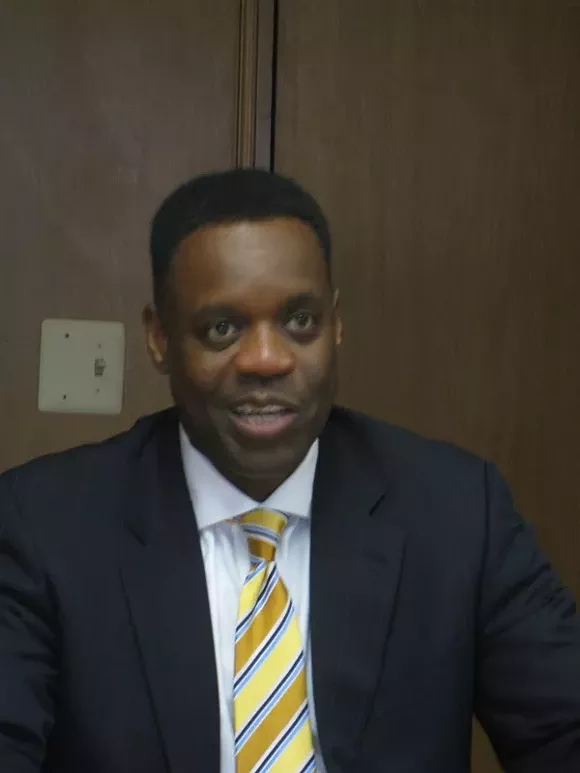Detroit mayor, council vote to keep Orr as EM for bankruptcy matters
[
{
"name": "GPT - Leaderboard - Inline - Content",
"component": "35519556",
"insertPoint": "5th",
"startingPoint": "3",
"requiredCountToDisplay": "3",
"maxInsertions": 100
}
]
After days of deliberation behind closed doors in private sessions, Detroit's mayor and city council voted to keep Emergency Manager Kevyn Orr in place until Detroit exits bankruptcy court.
Orr, however, will cede full control of the city's day-to-day operations, according to a a joint statement issued Thursday evening by Mayor Mike Duggan and Detroit City Council.
Under Michigan's emergency manager law, PA 436 of 2012, Orr could have been voted out entirely by city council — with Duggan's approval — by a two-thirds vote, which would take place as early as Sunday. But, Orr ushered Detroit into its historic bankruptcy — and, as the city's elected leadership put it, they need him to see the case through its conclusion.
"As the City approaches the end of its historic bankruptcy proceedings, it is absolutely imperative that the next steps continue to move the city towards an expedient emergence from bankruptcy," the joint statement said.
The resolution approved by council will allow Orr to remain in place "solely for the purpose of executing documents and overseeing litigation related to the bankruptcy proceedings," the statement said.
Duggan will send a letter to Republican Gov. Rick Snyder, who appointed Orr in March 2013, signing off on the council's resolution. The decision to keep Orr on in some capacity likely was a conflicting resolution for new councilmembers and Duggan, who campaigned on removing the emergency manager from office as soon as possible. The statement called the decision a responsible resolution in light of Detroit's ongoing bankruptcy, the largest of its kind in the nation's history.
"We, Detroit's elected leadership, are determined to do what's in the best interest of our city and remove the emergency manager quickly and responsibly," the statement said.
Duggan and City Council would assume oversight of Detroit's day-to-day operations "effective immediately," according to the order signed by Orr this evening.
"The EM agrees not to exercise his powers under PA 436 to interfere with the powers restored to the Mayor and the Council," the order said.
Earlier this year, Orr transferred some responsibilities to Duggan, but continued to maintain control of the city's finance and police department. Duggan will assume oversight of those remaining departments under the deal approved today, officials said.
Orr, who earns a $275,000 salary per year under his contract as Detroit's state-appointed emergency manager, will play a role to enact agreements in the bankruptcy like the so-called Grand Bargain, the statement said. It's unclear how long U.S. Bankruptcy Judge Rhodes will take to decide whether to approve Detroit's bankruptcy-exit plan, called a Plan of Adjustment. The city's bankruptcy trial is expected to wrap up in the coming weeks.
If Rhodes agrees that the plan submitted by Orr is feasible and legal under federal bankruptcy code, additional oversight for Detroit has been spelled out under state legislation approved earlier this year, which authorizes the use of $195 million toward the Detroit Institute of Arts settlement. Better known as the Grand Bargain, the settlement also calls for a $450 million in money from private foundations and the Detroit Institute of Arts to shore up Detroit's pension funds and save the museum's artwork from potentially being sold.
In other words, Duggan and City Council may be in the driver seat, but a nine-member oversight commission, seven of whom would be state appointees, would backseat drive for at least 13 years after Detroit's plan to exit bankruptcy is confirmed.
As Metro Times previously reported, the oversight commission would have the power to, among other things, review and approve the city's four-year financial plan, approve or reject all contracts for goods and services worth at least $750,000, and review requests by the city to issue debt.
Similar to other cities who have exited emergency management, such as Pontiac and Benton Harbor, it's likely Snyder will also appoint a Transition Advisory Board, which would sign off on fiscal matters approved by city council.
The city's nine-member Financial Advisory Board (FAB), appointed in mid-2012 as part of the city's consent agreement to implement cost-cutting measures, also continues to meet sparingly.
It's unclear if the FAB, which advises on the city's finances will remain in place. The board is expected to meet at 2 p.m. tomorrow inside the Michigan Room on the 3rd floor of Detroit's public safety headquarters, located at 1301 Third Street.







